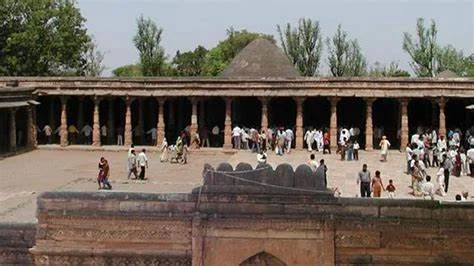As the Archaeological Survey of India (ASI) is conducting the survey of the Bhojshala complex-Kamal Maula Masjid in Dhar, Madhya Pradesh since last three day, the mosque’s management committee raises objections, asserting their rights amidst ongoing disputes over the site’s religious identity.
The Bhojshala complex in Dhar, Madhya Pradesh, stands as a testament to India’s rich cultural heritage, housing both a temple dedicated to goddess Saraswati and the Kamal Maula Mosque. However, recent developments surrounding the Archaeological Survey of India’s (ASI) survey of the premises have reignited long-standing tensions between Hindu and Muslim communities, with the mosque’s management committee vehemently asserting its rights to the site.
According to reports, the ASI’s survey, mandated by a court order, aims to shed light on the historical provenance of the Bhojshala complex. However, the mosque’s management committee has raised objections, citing concerns over the potential infringement of their religious rights and the sanctity of the site.
The dispute over the Bhojshala complex is deeply rooted in history and has been the subject of numerous legal battles and community conflicts over the years. As the ASI proceeds with its survey, it is essential to consider the perspectives of all stakeholders, particularly the mosque’s management committee, whose assertions reflect broader concerns about religious freedoms and cultural preservation.
Expressing their dissent, members of the mosque’s management committee emphasized the significance of the Kamal Maula Mosque as a place of worship for the Muslim community. They argue that any survey or intervention by external authorities must respect the religious sentiments attached to the site and ensure that the rights of the Muslim community are upheld.
Moreover, the mosque’s management committee contends that the ASI’s survey could potentially disrupt the peaceful coexistence and religious harmony that has prevailed at the Bhojshala complex for generations. They stress the importance of preserving the site’s multicultural heritage and fostering an environment of mutual respect and understanding among different religious communities.
The mosque’s objections to the ASI’s survey highlight broader issues of religious freedom and minority rights in India. In a country known for its religious diversity, it is imperative to safeguard the rights of all communities and ensure that their religious sites are protected from any encroachment or undue interference.
Furthermore, the mosque’s management committee calls for a more inclusive and consultative approach to resolving the dispute over the Bhojshala complex. They advocate for dialogue and consensus-building among all stakeholders, with the goal of reaching a mutually acceptable solution that respects the religious beliefs and traditions of both Hindu and Muslim communities.
As the ASI’s survey progresses, it is essential for authorities to heed the concerns raised by the mosque’s management committee and address them in a transparent and accountable manner. Any decision regarding the Bhojshala complex must prioritize the principles of justice, equality, and religious pluralism, ensuring that the rights of all communities are respected and protected.
In conclusion, the ongoing controversy surrounding the ASI’s survey of the Bhojshala complex underscores the complexities of religious identity and heritage preservation in India. While the ASI seeks to unravel the site’s historical mysteries, it must do so in a manner that respects the religious sentiments and rights of all stakeholders, particularly the mosque’s management committee, whose assertions highlight the need for a more inclusive and equitable approach to resolving disputes over religious sites.

